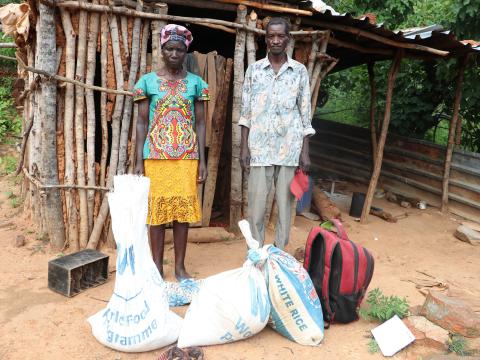Lean Season Assistance brings relief to Mudzi

Mudzi, Zimbabwe – Solomon Kondazawo (71) unties a rope around his donkey’s neck as he offloads two 25 kilograms bags of maize that he and his wife received under the World Food Programme (WFP) funded Lean Season Assistance (LSA) program in Matika Village, Mudzi.
Kondazawo, and his wife Shelter Tola (64) live in a two-roomed house made of poles and mud and are some of the most vulnerable of the 72 064 partners in Mudzi being assisted with food aid under LSA.
“Age is now catching up with us. This has also come with ill health,” said Kondazawo.
“Before the donor (WFP, World Vision and USAID) came, we were struggling to get food. We are no longer strong enough to work.
“Every time we would run out of food around this time of the year, I would be employed as a security guard at a friend’s shop in the afternoon for a 5-kilogramme bag of mealie meal. I no longer have to do it after the donor stepped in.”
Before the LSA , Solomon and his wife lived on two meals per day, one at mid-morning and the other in the evening. Both meals consisted of a starchy mealie meal porridge (sadza) as they could not afford a variety of other foods. This unbalanced diet has inevitably exposed them to malnutrition, making them vulnerable to various other diseases. They are forced to rely on help from their neighbours’ children when it comes to fetching water and farming.
“My legs are always swollen, and I walk more than a kilometre to fetch water. I can only manage to carry half a bucket,” his wife, Tola said.
“Life is tough for us. We depend on other people for almost everything in our lives. We have absolutely nothing and if it wasn’t for the donor, I do not know what we could be eating now.”
The couple’s hard life has been made easier with the LSA program. The food packs they receive provide a more balanced diet for them and they say the food they received on the programme will take them to March when they start harvesting their crops.
“We are very happy with what the donor is giving us. The maize, cooking oil and pulses we receive have enabled us to eat a variety of meals,” Kondazawo said.
The senior citizens say they hope their harvest will last till the next season. But in the meantime, they thanked WFP, World Vision and USAID for supporting the most vulnerable in their village helping others who are like them to not depend fully on handouts.